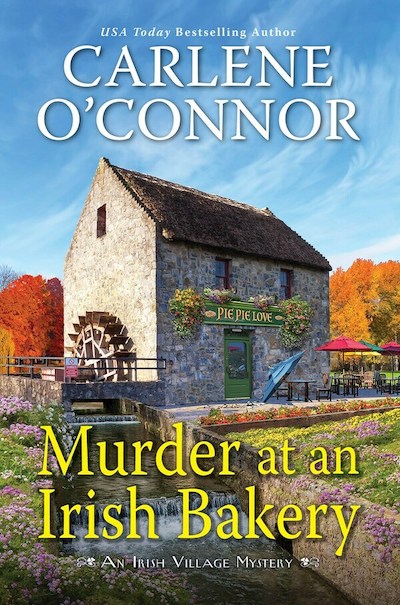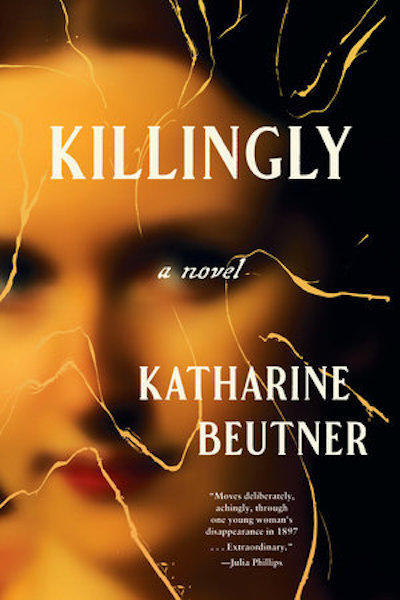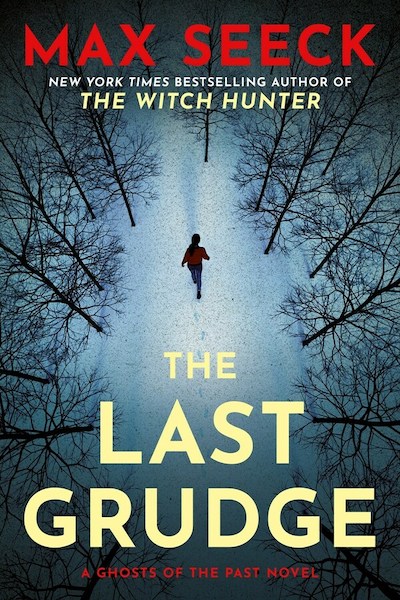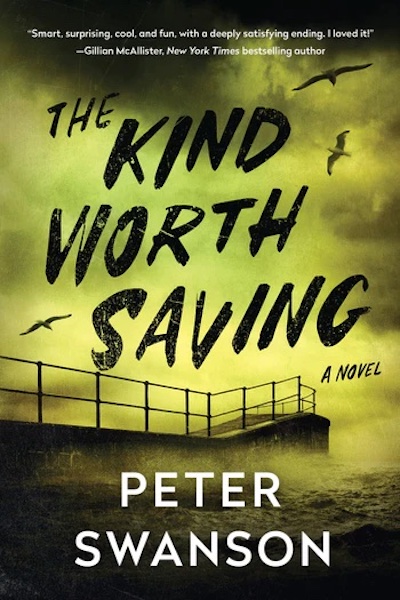We don’t normally review the 11th book in a series, because typically after a few titles the series needs no further introduction. But I grabbed this one from the (virtual) pile because 1. It’s set in Ireland, my former home; 2. It’s set in a bakery, my spiritual home; 3. Murder. The Ireland here is a thoroughly modern one, with the tale set around a baking-competition reality show. Famous cookbook author Aoife McBride is the one to beat, as the contestants vie to impress the judges with elaborate chocolate constructions, fancy layered creations, and to-die-for tea cakes, all to win twenty-thousand Euro and a boost to their baking-career ambitions. The producers throw in reality-show-required conflict, of course, but get more drama than they bargained for when a protester (“Sugar kills! Stop the show!”) outside the studio mysteriously drops dead. His is not the last face to fall in the flour, so to speak. Gardaí (police officers) Siobhán O’Sullivan and Aretta Dabiri and Siobhán’s new husband, Detective Sergeant Macdara Flannery, must solve the mystery while the cameras roll and the baking puns fly. This has more than the contestants’ groan-worthy puns, though, with O’Connor (No Strangers Here) giving readers a healthy balance of whodunit and bitchy competition, not to mention a cute relationship in still-in-the-honeymoon-phase Siobhán and Macdara. The closing recipe for Nigella Lawson’s Chocolate Guinness Cake alone is worth the book price.
Mystery & Detective
A haunting tale set in the rarefied world of Mount Holyoke college, the oldest of the Seven Sisters, and inspired by a true story. It’s 1897 and Bertha Mellish, a quiet and rather odd junior, has gone missing, last seen walking into the woods that surround the college. As days go by, her disappearance draws to campus her sister and father—an enfeebled minister from Killingly, Connecticut—the police, and a private investigator hired by the family. But the one person who likely knows what happened to Bertha is Agnes Sullivan, and she’s being incredibly circumspect. Agnes is poor and Irish, a promising scientist, and Bertha’s closest friend…or lover? At a time when women in an environment like Mount Holyoke could establish romantic relationships, and display affection, Agnes and Bertha were such a couple—in fact, they planned after graduation to live in a Boston Marriage, the name for two women who set up a household together. So why is Agnes so tight-lipped? Rape, incest, abortion, vivisection, and insanity swirl around the narrative, as does the imagining of the precarious lives of women, even when privileged. Beutner does a wonderful job of pulling the reader into this world then locking the door behind us, keeping us engaged until the very last page.
A classic police procedural that does a miraculous job of balancing the investigation on the one hand and the complex personal lives of the detectives on the other. One of Helsinki’s most successful business leaders is murdered in his home, by a kitchen knife to his heart. He was on his way to a dinner celebrating his company’s fiftieth anniversary, an event overshadowed by protests because of recent layoffs he’s authorized. Yusuf, one of the leading detectives throughout this series, is put in charge of the investigation, which leads inward, with a meticulous examination of the apartment, and outward, contacting many of the executive’s colleagues and just individuals with whom he may have had contact. Unnerved at his leadership position, Yusuf brings on Detective Jessica Niemi, his partner in the earlier books, who’s now on leave trying to escape from her personal demons—literally, not metaphorically. As the story briskly unfolds—Seeck keeps the plot moving—the past and the present collide in a terrifying way. While this can be a stand-alone, it’s best to read it as part of a series. For fans of Camilla Läckberg and Jo Nesbø.
It’s no wonder Harry Duncan’s ex-wife, Ellen, a U.S. Attorney, calls him when her cases need some extrajudicial help. Former cop Harry is an expert at getting himself into trouble—just the kind that suits his investigations—and getting back out, with each leg of the journey equally satisfying. His current murder book, or record of a crime investigation, opens when Ellen asks him to hit the road on her behalf to look into what might be a new criminal organization setting itself up in Indiana. Arriving in Parkman’s Elbow, a town identified as one focus of the possible gang, Harry stops for lunch, the action finds him immediately, and his combination MacGyver/James Bond maneuvers are decidedly ON. The investigation often takes a back seat as readers get lost in Harry’s vigilante moves—defeating bumbling bad guys in ways that ridicule them, saving a woman the gang is trying to extort—and his smart evasion and tracking methods. But the case is almost beside the point when such exciting chases and devastating put-downs of criminals are on the menu. Would the police really ignore the wild things Harry does? Probably not, but you won’t care. One for a late-night binge.
I love mysteries that feature the famous, from Walt Whitman to Dorothy Parker to Eleanor Roosevelt. But featuring a living celebrity—in this case, Bernie Sanders—is even more of a challenge, one that Shaffer succeeds at wonderfully. Gen Z intern Crash Robertson is our wisecracking intern and narrator, and after months of answering phones in the DC office—from constituents who don’t know how to text?—she gets to accompany the senator on a fall-recess trip to Vermont. By chance, they head to Eagle Creek, Crash’s hometown, and end up staying in her mother’s B&B. But what has the makings of a low-key visit with constituents, and plenty of apple griddlecakes, suddenly gets upended when Crash finds the body of the local banker floating in Lake Champlain. Crash’s running commentary on Bernie—who’s always ready to deliver a lecture on the declining honeybee population, or the cozy series he’s reading, set in a cannabis bakery in the Northwest—makes for a good part of the humor in the book. But when a second citizen goes missing, it’s time for our team to get down to work. The biggest suspect is a tech-obsessed one-percenter, think Elon Musk, who’s buying up acres of maple trees, driving out local farmers, and monopolizing maple syrup production in a move Bernie dubs “Big Maple.” Unmitigated fun for everyone, no matter where they might fall on the political spectrum. Shaffer is also the author of the Obama mysteries, Hope Never Dies and Hope Rides Again.
We’re deep into the Second World War, and Archie Swann—the police officer on Fourth Cliff, a fishing island off the Massachusetts coast—is fighting in the Pacific theater. But his wife, Mary Beth, herself a cop trained by the Boston Police Department, has stepped into his position. While Archie was beloved, Mary Beth is loathed, largely because of her gender, and the easiest of tasks is a struggle. While the island has traditionally seen little crime—settling fights between drunk fishermen and resolving domestic disputes seemed to be the bulk of the work—things have changed under Mary Beth’s watch. The body of a soldier, who lived in a camp for Italian POWs on the island, is hauled up from the sea by fishermen, a murder that creates unrest among both islanders and prisoners. When that murder is followed by others, Mary Beth, whose supports are a doctor who is untrained as a coroner and a deputy who is intellectually disabled, turns to the only real help she can find: organized crime from the mainland. But the real story here is the internal one: Mary Beth’s loneliness, her longing for Archie, her need to always maintain a tough outer shell, her battle against feeling like a failure. Novels about women in the War have blossomed in the past few years, but few have the grittiness, honesty, and authenticity in emotion, language, and detail of Swann’s War.
Bakers, cozy fans, and those who just love a fun, traditional mystery will want to abandon whatever they’re doing to read this novel to its very bloody end. A mashup of the TV series The Great British Bakeoff and the film Knives Out, the book stars Betsy Martin, “American’s Grandmother,” who’s sweet as pecan pie on the outside but tough as overmixed batter on the inside. Betsy created the show Bake Week, which is filmed at her Grafton, Vermont mansion—no fear of Spotted Dick in New England, TG— which also houses the six well-drawn contestants. For years, Betsy has ruled supreme over the show, but this season she’s being forced by the producers to take on another judge to—shudder—sex things up. What could go wrong? First, someone switches the sugar and salt, then a burner “accidentally” gets set on high. In the end, the whole show comes crashing down like some deflated meringue. But you’ll hear no spoilers from me—getting to the resolution on your own is too much fun.
This is one richly drawn mystery that does a great job of introducing us to a wonderful protagonist, a compelling group of characters, and a fascinating community. Poor 28-year-old pastry chef Chloe Barnes. Not only does her engagement end up in smoke, she gets panned in a review, then learns that her beloved grandmother is being treated for cancer. Time to leave Paris and head home to Azalea Bay, California. But what to do with herself? Fortunately, her Aunt Dawn has an idea: take her fancy, pastry-making skills and apply them to cannabis to create edibles so good they can hold their heads high in the best pâtisseries. Together they begin to plan for a store, Baked by Chloe, when there’s a murder—of a creepy guy who’s loathed by most of the female population of Azalea Bay—and Aunt Dawn ends up the number one suspect. Clearing her aunt’s name draws Chloe further into the past and the community as she creates a list of suspects. The book also goes deep into the weeds (see what I did there?) as Chloe learns the complexity of cooking with cannabis. And did I mention Jake? Cute, single, and lives next door. In this debut, author George has laid the foundation for a series that feels fresh, young, and full of surprises.
This is an espionage story with a difference, featuring not a dashing ladies’ man but a young CIA operative, Melvina Donleavy, who knows her bureaucracy and sticks to it, offering an interesting look at modern-day tradecraft. Mel appears to her CIA colleagues to have no special skills, but when she’s in danger, top levels of government get involved. Readers are in on the picture, learning from the get-go that Mel has lifelong recall of every face she sees. It freaked out a middle-school crush when she mentioned having seen him at a sports event that had thousands in attendance, but when she’s sent to Byelorussia in 1990 to see if particular Iranian nuclear scientists can be spotted it’s a handy talent indeed. Mel and her colleagues are undercover, the others posing as accountants who are sent ahead of a U.S. donation to make sure none of it is earmarked for nuclear activity, she as their secretary. The stultifying Soviet observation machine moves into place, with the spies watched everywhere they go and a rigid air of we-know-you’re-spies-and-we-know-that-you-know-we-know coming off their hosts in waves. The group soon hears that a serial killer, the Svisloch Dushitel, or Svisloch Strangler, is at work in Minsk, but as its illegal to even mention the crime of serial killing, Mel has her work cut out to get to the bottom of it. Espionage, a love story, and murder mystery, all by a Department of Defense contractor assigned to the former Soviet Union in the ‘90s? Yes, please.
A sequel of sorts to the devious The Kind Worth Killing, this novel also features PI Henry Kimball, one of the more low-key but wry detectives in the business. Central to this story is Joan, one of Henry’s students from the one year he taught high school. She pops up in his life wanting him to prove that her husband is cheating on her—a bread-and-butter job for any detective—except Henry can’t quite shake the feeling that there’s more to the story than Joan is telling. As it turns out, Joan, helped out by her buddy Richard, has been a murderer since high school–it’s the only thing that really brings the friends to life–and Swanson takes us through each of the perfect murders the team has executed. By the time we get back to the present, it’s clear that there’s a whole lot more in store for Henry than he would ever have imagined. Swanson is such an adroit novelist, moving us smoothly from present to past and back again, building up the tension, stoking the anxiety, all while interjecting some perverse humor through the characters and their observations. And kudos for such a surefire depiction of the Boston suburbs. Reading the earlier book first would be slightly helpful, but this still works as a standalone. Wickedly delicious!










